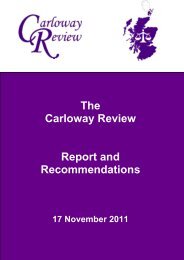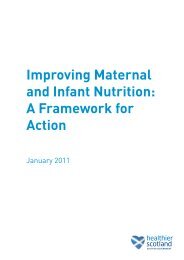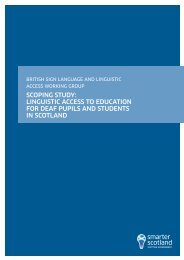Children's Needs â Parenting Capacity - Digital Education Resource ...
Children's Needs â Parenting Capacity - Digital Education Resource ...
Children's Needs â Parenting Capacity - Digital Education Resource ...
You also want an ePaper? Increase the reach of your titles
YUMPU automatically turns print PDFs into web optimized ePapers that Google loves.
How mental illness, learning disability, substance misuse anddomestic violence affect parenting capacity 75Living standards can also be adversely affected because family income is used tosustain parents’ excessive alcohol or drug use. Coleman and Cassell (1995) estimatedthat a ‘reasonable income’ can support alcohol or methadone habits but only thevery rich can afford to fund the continued use of heroin or cocaine. However, overrecent years the street price of heroin and cocaine has fallen considerably and averageincome has increased, even taking into account inflation. The price of alcohol,compared to income, has also come down. It is likely that a drug or alcohol habittoday (i.e. in 2011) is ‘more affordable’ than 10 years ago, but only if we assume thatthe individual’s consumption hasn’t increased as well.To sustain excessive drinking or an escalating drug problem, many parents seekan additional source of income; parents may engage in criminal activities such asshoplifting, drug dealing or prostitution (Hogan 1998; Barnard 2007). Shieldingchildren from the criminality associated with problem drug use is difficult, and insome cases parents use children as a cover for their criminal activity. ‘Cos I used tokind of use her as well, so that I wouldn’t get pulled by the police and things like that if Ihad her with me’ (drug-misusing parent, quoted in Barnard 2007, p.74). The homemay also be jeopardised because money for rent and essential household items suchas food, heating, and clothing is used to satisfy parental needs, or bills are simplyoverlooked or regarded as irrelevant (Velleman 1996).The impact of criminal activities may place children at risk of suffering significantharm in several ways. Drug dealing, which often takes place in the child’s home,means children cannot easily escape exposure to drugs and other drug users. Drugdealing places families at risk of police raids, but of more concern is the likelihoodof children witnessing their home raided by other drug users looking for money ordrugs and using intimidation and violence to get what they want. ‘Then, the housethat I was staying in, the fella was selling heroin and we got robbed at knifepoint. Now thekids were there when this happened...’ (Barnard 2007, p.75). The impact on childrenmay be indirect; exposure to criminal behaviour may affect children’s attitudes toauthority and crime (Hogan 1998). Prostitution, one way of sustaining an expensivedrug habit, may result in even very young children observing or being drawn intoinappropriate sexual activity (Cleaver and Freeman 1995; Barnard 2007).Violent and aggressive outbursts are associated with domestic violence, problemdrinking or drug use and the lifestyle associated with drug dealing. ‘There was a lotof violence that Nicky (aged 2 years) was seeing. Andrew was drinking. He was verballyaggressive. It was after an England football match that he had been drinking and helashed out at me and broke my arm ...’ (mother, quoted in Cleaver and Nicholson2007, p.202). Such incidents can also result in adults deliberately damaging property.When this takes place within the home, the fabric of the house may be destroyedand the place becomes unsafe for children to live in.Apart from children being exposed to such dangers, parental problems may alsoresult in children being neglected or exposed to potentially harmful situations.Homes need to offer warmth, sanitation and shelter and to reach basic standards ofhygiene. The effects of mental illness, learning disability, problem drinking and drug
















